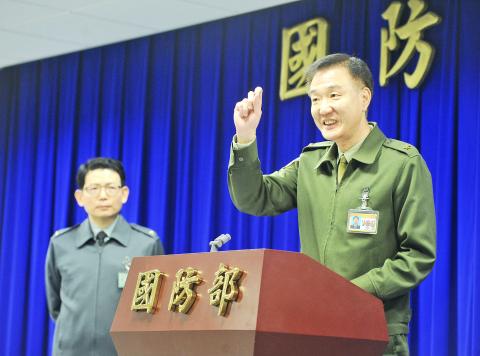The Ministry of National Defense yesterday issued a public apology over the controversy caused by military police going to a civilian’s home in connection with an investigation into the alleged online sale of classified government documents related to the White Terror era.
“The Ministry of National Defense would like to deeply apologize to the public for the concerns and uproar that the case has caused,” Political Warfare Bureau Director Wen Chen-kuo (聞振國) said during a morning news conference at the ministry. “We would also like to urge the public to discuss the matter rationally and objectively, so that the focus of the issue is not blurred.”
The ministry would ask the Control Yuan to investigate whether its Security Division or the Taipei Military Police made any administrative mistakes, and prosecutors have also been asked to investigate the matter, he said.

Photo: CNA
“There is a difference between having a document as part of a personal collection and putting it up for public auction,” Wen said. “Selling classified documents from the government’s archives could jeopardize national security and contravene the law.”
Classified documents should be placed in the care of the relevant government units or police, the ministry said, adding that the online auction of such documents is inappropriate.
Military Police Command Chief of Staff Feng Yi (馮毅), who also took part in the news conference, said that no actual search was conducted by military police officers of the civilian’s home.
“Military police received a tipoff that a man, surnamed Wei (魏), was selling classified documents online and they subsequently launched an investigation,” Feng said. “Because the probe was still in an early stage, no actions, such as applying for a search warrant, were taken.”
Posing as potential buyers, the investigators met with Wei at his home and he handed them the documents, which were stored in a damp-proof cabinet, Feng said, adding that Wei had given the officers a signed consent form before he gave them the documents.
However, Wei has said that he only handed over the documents after being threatened with prosecution for concealing them and for leaking state secrets.
Captain Chan Kuo-yi (詹國毅) of the ministry’s Security Division said that an initial probe found that Wei had sold three declassified documents online.
The documents should have been destroyed after they were declassified, but were probably smuggled out, Chan said.
Defense ministry spokesman Major General David Lo (羅紹和) told the news conference the case did not involve any Taiwanese or Chinese spies.
However, his statement contradicted remarks made on Sunday by Hsieh Ming-te (謝明德), the top political warfare officer at the Military Police Command, who told reporters that the documents in question were related to communist Chinese spies and their confessions after they surrendered to the Chinese Nationalist Party (KMT) government in the 1960s and 1970s.
Ministry officials said that Wei’s case is now being investigated by the judiciary and that the ministry would cooperate.
Five military police officers involved in the Wei investigation were summoned yesterday by the Taipei District Prosecutors’ Office for questioning. Details of the questioning were not revealed by the military police officers or the prosecutors’ office.
Additional reporting by Loa Iok-sin

Taiwanese can file complaints with the Tourism Administration to report travel agencies if their activities caused termination of a person’s citizenship, Mainland Affairs Council Minister Chiu Chui-cheng (邱垂正) said yesterday, after a podcaster highlighted a case in which a person’s citizenship was canceled for receiving a single-use Chinese passport to enter Russia. The council is aware of incidents in which people who signed up through Chinese travel agencies for tours of Russia were told they could obtain Russian visas and fast-track border clearance, Chiu told reporters on the sidelines of an event in Taipei. However, the travel agencies actually applied

New measures aimed at making Taiwan more attractive to foreign professionals came into effect this month, the National Development Council said yesterday. Among the changes, international students at Taiwanese universities would be able to work in Taiwan without a work permit in the two years after they graduate, explainer materials provided by the council said. In addition, foreign nationals who graduated from one of the world’s top 200 universities within the past five years can also apply for a two-year open work permit. Previously, those graduates would have needed to apply for a work permit using point-based criteria or have a Taiwanese company

The Shilin District Prosecutors’ Office yesterday indicted two Taiwanese and issued a wanted notice for Pete Liu (劉作虎), founder of Shenzhen-based smartphone manufacturer OnePlus Technology Co (萬普拉斯科技), for allegedly contravening the Act Governing Relations Between the People of the Taiwan Area and the Mainland Area (臺灣地區與大陸地區人民關係條例) by poaching 70 engineers in Taiwan. Liu allegedly traveled to Taiwan at the end of 2014 and met with a Taiwanese man surnamed Lin (林) to discuss establishing a mobile software research and development (R&D) team in Taiwan, prosecutors said. Without approval from the government, Lin, following Liu’s instructions, recruited more than 70 software

Chinese spouse and influencer Guan Guan’s (關關) residency permit has been revoked for repeatedly posting pro-China videos that threaten national security, the National Immigration Agency confirmed today. Guan Guan has said many controversial statements in her videos posted to Douyin (抖音), including “the red flag will soon be painted all over Taiwan” and “Taiwan is an inseparable part of China,” and expressing hope for expedited reunification. The agency last year received multiple reports alleging that Guan Guan had advocated for armed reunification. After verifying the reports, the agency last month issued a notice requiring her to appear and explain her actions. Guan